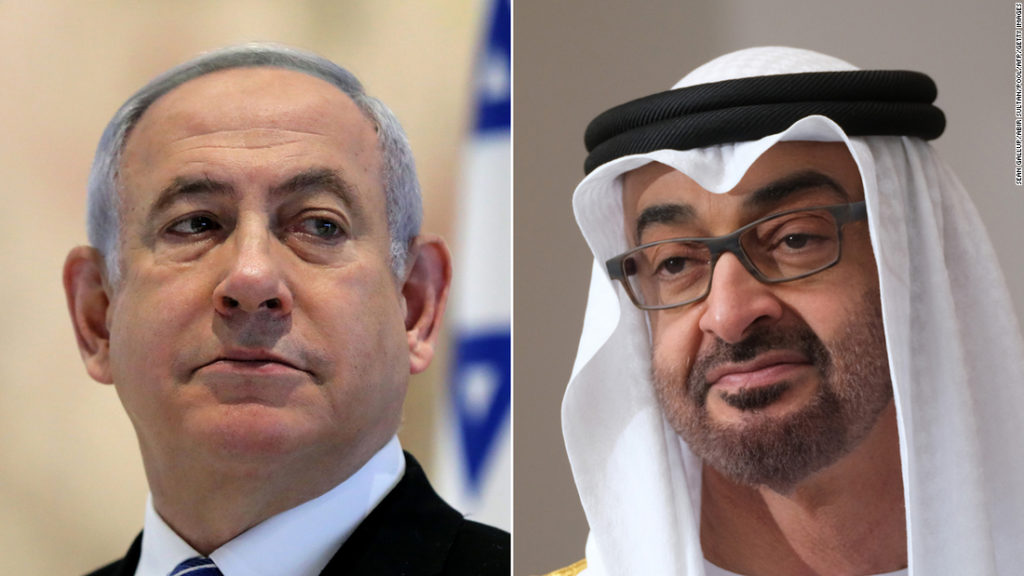Blossoming is, perhaps, an understatement. Since the 1978 Camp David Accords, Israel has “normalized” relations with Egypt, Jordan (1994), Mauritania (1999), and most recently, the UAE and Bahrain. Last month Israel and Sudan also signed an agreement to normalize ties.
Yet never has the process of normalization been so fast, and pursued with such mutual enthusiasm, as between Israel and the UAE. And it goes beyond that. The UAE appears to have dropped, in practical terms, any objections to Israel’s occupation of Arab lands.
The Emirates last month hosted a group of Israeli settler leaders from the West Bank, territory occupied by Israel since the 1967 war with Jordan, Syria and Egypt.
In October, it also allowed the import of wine produced by Israeli companies in the Golan Heights, also occupied by Israel since 1967.
The UAE will also finance with the US and Israel a project to “modernize” Israeli checkpoints in the West Bank used to control and monitor the movement of Palestinians.
This month the Israeli airline, El Al, and Etihad, the Emirati airline, signed a memorandum of understanding and will start direct flights between Tel Aviv and Abu Dhabi early next year. Budget airline flydubai has already started its commercial service to Ben Gurion airport.
Etihad raised eyebrows, however, when it released an advertisement for flights to Tel Aviv which included an illustration with the caption “Second Temple.” The Second Temple, on Jerusalem’s Temple Mount, was destroyed by the Romans in 70 AD. In its place is the Haram Al-Sharif — the location of the Dome of the Rock and Al-Aqsa mosque (the third holiest site in Islam after Mecca and Medina). After an angry backlash, Etihad quickly removed it.
Then, on November 22, the Israeli cabinet ratified a mutual visa exemption with the UAE — the first of its kind with any of the Arab states it has relations with.
Compare this with the case of the first two countries that made peace with Israel: Egypt and Jordan.
Egyptians and Jordanians — some of whom have still vivid memories of multiple wars with Israel — approached normalization cautiously or rejected it altogether. Just this week the Egyptian Union of Artistic Syndicates suspended singer and actor Mohamed Ramadan after it emerged on social media that he had attended a gathering in the UAE and posed for photos with Israeli athletes and artists. Ramadan reportedly explained that he does not ask each fan’s nationality.
Egypt and Israel signed the Camp David Peace Accords 42 years ago. Jordanians, a majority of whom trace their roots back to historic Palestine, have also been hesitant to embrace Israel.
Palestinian ambassador to Austria Salah Abdel Shafi called the pace of normalization between the oil-rich country and Israel “shocking.”
“If I compare the level of normalization between (Egypt and Jordan) and the UAE, within a record time [there have been] mutual visits, agreements in trade, basically all aspects … it is shocking,” Abdel Shafi told CNN.
The Israeli-Emirati honeymoon has been a whirlwind, but the affair — initially covert — dates back to the mid-1990s, according to multiple media reports.
Apart from the obvious benefits of close business ties between two wealthy countries, Israel and the UAE share concern about Iranian influence in the region.
Iran has seen its influence grow, particularly since the US-led coalition toppled Iraqi leader Saddam Hussein in 2003. Tehran backs to varying degrees the regime of Bashar al-Assad in Syria, Hezbollah in Lebanon, the Houthis in Yemen, and powerful Shia parties and militias in Iraq.
Likewise, the fig leaf of Arab unity and solidarity withered up and blew away years ago. The Palestinian cause, once sacrosanct, has become a nuisance, particularly for the Gulf states.
Israel, once the official arch-nemesis of the Arab states, has been replaced by another.
“Both the US and Israel want Arab countries to think their main enemy is Iran,” says veteran Palestinian activist and legislator Mustafa Barghouti, commenting on Emirati-Israeli normalization.
The UAE, however, insists its normalization agreement with Israel will benefit the Palestinians. The accord, says Emirati Foreign Minister Sheikh Abdullah Bin Zayed, “will enable us to continue to stand by the Palestinian people, and realize their hopes for an independent state within a stable and prosperous region.”
The Gulf monarchies have always been wary of the Palestinians. They needed skilled Palestinians to build their countries and educate their children in the early years of the oil boom, but were never comfortable with the revolutionary ideologies many Palestinians brought with them.
Not long ago in the Arab world there was a modicum of unanimity on the primacy of the Palestinian cause. The Arab League endorsed the late Saudi King Abdullah’s 2002 Arab peace initiative which offered full normalization of ties with Israel in exchange for an Israeli withdrawal from the territories occupied in the 1967 war.
That initiative is all but dead. With Palestinians divided between an isolated Hamas ruling Gaza and an aging, aid-dependent Palestinian Authority with limited sway in parts of the West Bank, both pitted against an Israel that has enjoyed, especially for the last four years, a blank check from Washington, support for the Palestinians might seem like a waste to many Arab regimes.
Wary of Iran, the UAE is following in the footsteps of President Donald Trump, who in his inauguration made clear he was putting his country, the United States, first. Narrow self-interest has beaten out old alliances and causes. Trump’s days as president are numbered, but his doctrine has found fertile ground in the Gulf.
You may also like
-
Afghanistan: Civilian casualties hit record high amid US withdrawal, UN says
-
How Taiwan is trying to defend against a cyber ‘World War III’
-
Pandemic travel news this week: Quarantine escapes and airplane disguises
-
Why would anyone trust Brexit Britain again?
-
Black fungus: A second crisis is killing survivors of India’s worst Covid wave

